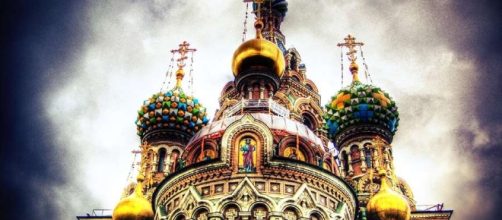Thursday, April 20, 2017, the Russian Federation turned against organized religion within its borders, starting with Jehovah’s Witnesses. In a case that affects all Russian citizens and residents, the nation’s Supreme Court, in Moscow, ruled to liquidate the Administrative Center of Jehovah’s Witnesses, near Saint Petersburg, and all its 395 title-holding Local Religious Organizations, effective immediately. The judgment gives Russia’s Ministry of Justice full authority to seize and confiscate Jehovah’s Witnesses’ national headquarters and all its places of worship.
Justice Yuri Ivanenko—the sole Supreme Court judge—pronounced, “These become the property of the Russian Federation.” Remarkably, it took him just one hour to deliberate alone, reviewing six trial days, 43 volumes of relevant documents, and the testimony of expert and lay witnesses, to convict Jehovah’s Witnesses as an extremist organization and to reach his ruling.
Jehovah’s Witnesses extremists?
Call them “annoying.” Call them “those people who wake me up early Saturday morning when I want to sleep.” But you probably never associated Jehovah’s Witnesses with radical terrorists or an extremist organization. Nowhere but in Russia has such a connection ever been drawn, an accusation that high-level officials in various Moscow embassies scoffed as “completely absurd.” With 175,000 adherents—that is, one ‘terrorist’ for roughly every 830 Russians—one would think the entire nation would have been obliterated by now.
Scant remedy left
The defense for Jehovah’s Witnesses says it will file an appeal with the three-member Supreme Court appellate panel, to be heard within a month. It also will apply to the European Court of Human Rights (ECHR), in Strasbourg, France, a powerful judicial entity. In 1998, Russia ratified the European Convention on Human Rights, thus binding itself to uphold the same rights guaranteed by all member States.
ECHR decisions are thus binding in Russia.
Flagrant disregard for human rights
Yet, according to London’s online “Independent,” on Dec. 15, 2015, President Vladimir Putin conveniently excused Russia from complying with any decisions from higher authorities like ECHR, if they contradict Russia’s Constitution. In President Putin’s view and that of the Constitutional Court, the Constitution takes priority over international law.
But here’s the rub: Russia’s Constitution guarantees a certain little human right known as freedom of religion. So it works this way: ‘We won’t play the game by your rules because we have our own. But don’t feel bad. We don’t even play by our own rules either.’
Deplorable record
Since 1998 the ECHR has issued numerous judgments against Russia’s government for its heavy-handed treatment of Jehovah’s Witnesses. Thousands of others have also applied for and been granted injunctive relief, including members of Evangelical religions and certain branches of Islam. According to the ECHR’s Press Unit, the Court in 2016 received over 7,000 applications—each almost invariably encompassing multiple parties—just from aggrieved Russian citizens.
The nation’s record with its citizenry is deplorable at best.
Russia bans Jehovah’s Witnesses, calling it an extremist group, comparable to the Islamic State https://t.co/FtlfYruOYT
— Bartosz Brzeziński (@aperi_oculos) 21 April 2017
Embarrassing answers
All Russians should be deeply worried that the Supreme Court found in favor of the Ministry of Justice. Justice Ivanenko repeatedly put the question to the prosecution: If people study the publications of Jehovah’s Witnesses, will they be taught to commit crime? Each time the prosecution muttered an evasive, incoherent answer. The Court asked them to cite the legal basis for liquidating the national headquarters of Jehovah’s Witnesses. They could not do so.
To the question of if the national headquarters, during the Ministry of Justice’s 10-year investigation, had ever used funds for an improper purpose, they likewise had no answer.
Basic instinct
According to the Ministry of Justice’s own statements in open court, the 10-year investigation failed to uncover a single incident of extremist activity by Jehovah’s Witnesses anywhere in Russia. If those 43 volumes of documents show no misconduct, did Prosecutor General Yury Chayka follow mere instinct in hounding Jehovah’s Witnesses and branding them an ‘extremist’ organization? The Supreme Court effectively upheld that official ‘instinct’ officially trumps such an embarrassing lack of evidence.
Danger to all Russians
Russia’s taxpayers have thus funded a 10-year totally fruitless investigation. At their expense, their highest judiciary has opened the door against its own people, now ostensibly empowering the government to liquidate every single religious organization. This portends the criminalizing of virtually anyone in Russia who doesn’t worship like Eastern Orthodox Catholics.
What this means
Do you pray at home as a family? You’re all criminals! Do you speak of your faith with workmates? You’re an extremist! Do you attend religious services other than Eastern Orthodoxy? You conspire to overthrow the Russian government! It may soon be that Eastern Orthodox Catholics are Russia’s only citizens not branded as criminals.
This begs the question: What does the Prosecutor General of the Russian Federation plan to do with all its millions and millions of other-Orthodox Christians, its Roman Catholics, the non-Catholic Christians, Jews, Muslims, Buddhists and Atheists? Get ready. You’re next.

